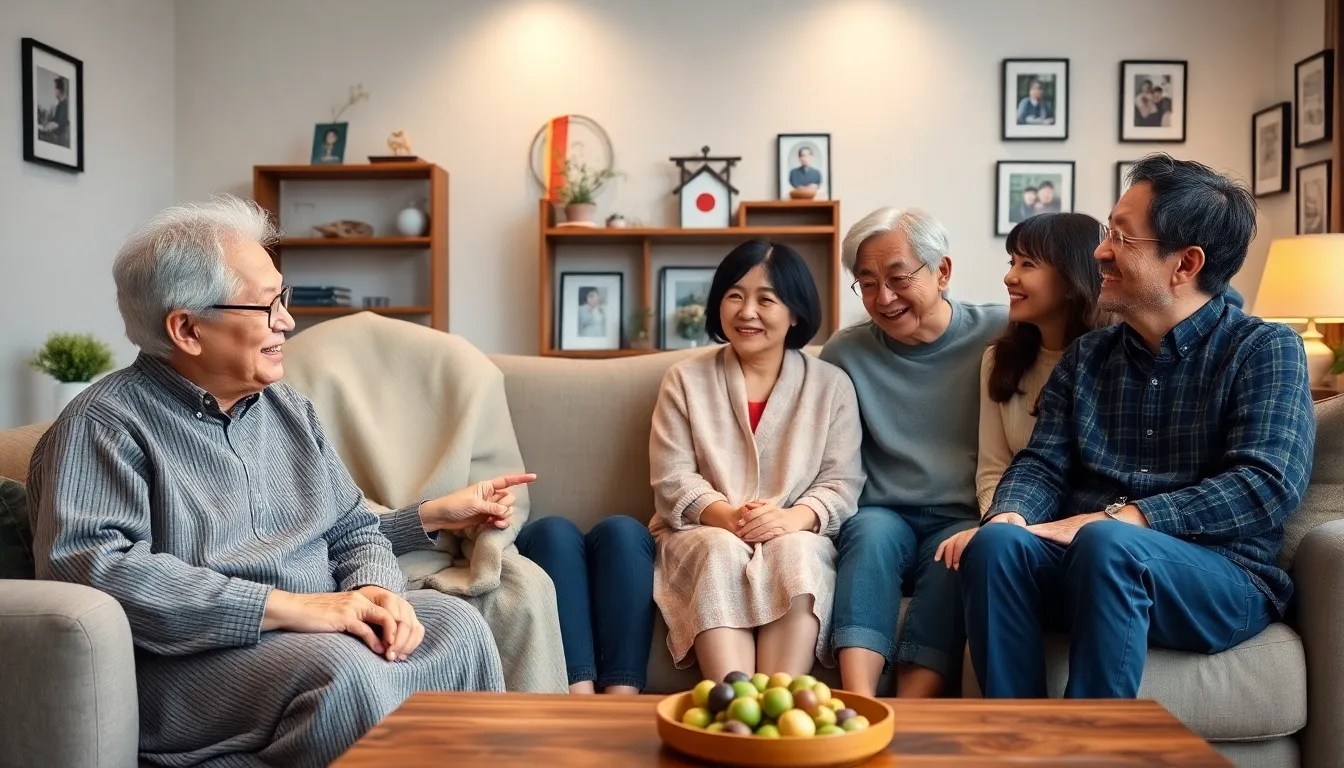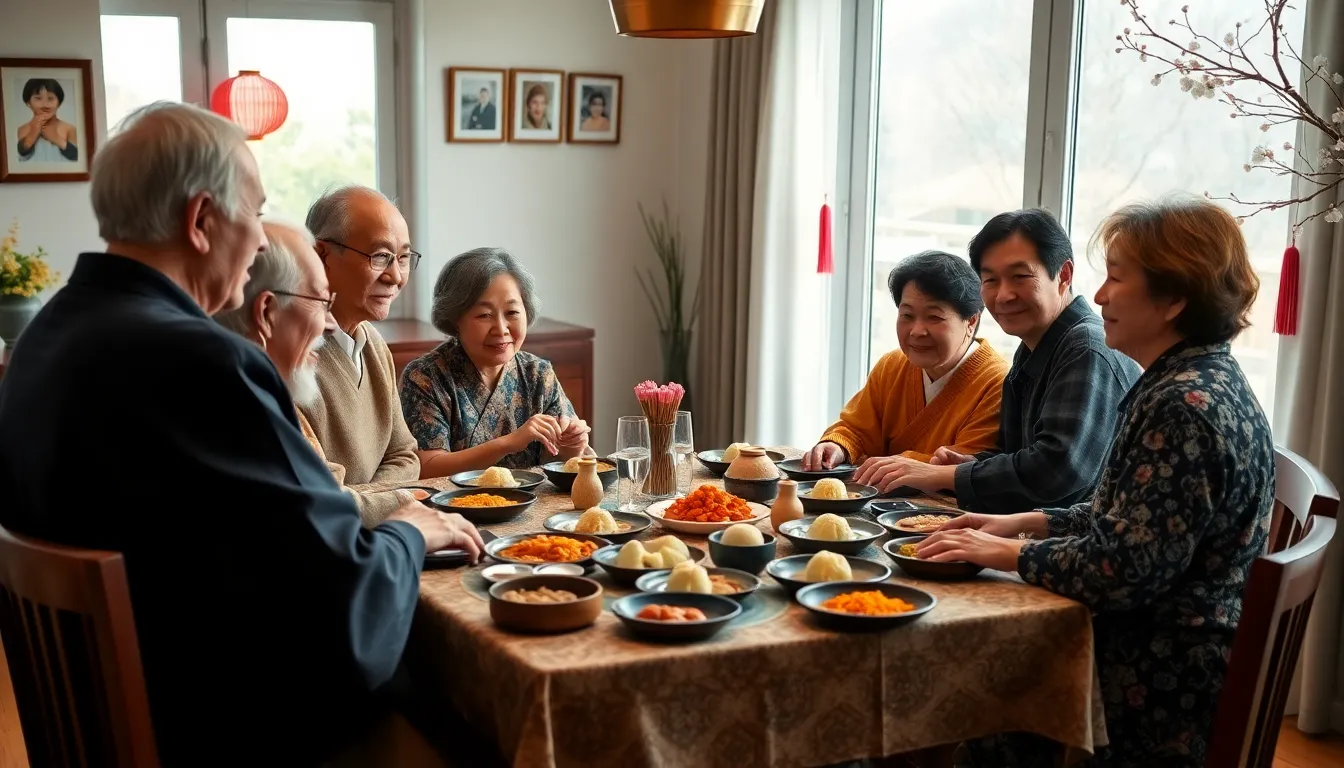When you think of Japan, sushi and cherry blossoms might come to mind, but what about the fascinating family traditions that tie it all together? Japanese family life is deeply rooted in rich customs and values that have stood the test of time. Imagine a culture where respect for the past harmonizes perfectly with the future. Immerse as we explore the intricate tapestry of Japanese family traditions, where laughter meets reverence and respect intertwines with celebration.
Table of Contents
ToggleKey Elements of Japanese Family Structure

Japanese families are often characterized by their close bonds and intricate hierarchies. Typically, a Japanese household includes several generations living together, embracing a philosophy that values communal living and emotional support. Central to this structure is the profound concept of “ie” or family lineage, which emphasizes the importance of the family unit over individual desires.
Hierarchy plays a huge role in family dynamics. The eldest family member, often a grandfather or grandmother, is revered, serving as both a guide and an embodiment of familial wisdom. It’s fascinating how siblings are also close, often sharing everything from childhood secrets to adult responsibilities. This system fosters a profound sense of loyalty and connection that’s palpable at family gatherings.
The Importance of Ancestry and Respect for Elders
In Japan, ancestry isn’t just a line on a family tree: it’s a vital aspect of identity. Families think deeply about their genealogical roots, engaging in elaborate rituals to honor their ancestors. This respect for lineage is coupled with a strong reverence for elders, often seen in the phrase, “The revered and wise.” Older generations impart knowledge and cultural values, forming the backbone of familial identity.
Respect is woven into everyday interactions. It shows in the language used, especially through honorifics, which change based on age or status. These subtle linguistic cues reflect a broader cultural ethos: treating others with dignity and appreciation, especially those who paved the way.
Traditional Celebrations and Festivals
Japan is home to a plethora of celebrations and festivals that showcase the beauty of family bonds amidst cultural vibrancy.
Seasonal Family Activities and Customs
Each season brings its own traditions. During spring, families often rejoice in Hanami, the viewing of cherry blossoms, where picnics under blooming trees symbolize renewal and unity. Summer heralds the start of fireworks festivals, where families gather to admire the spectacular displays, creating memories that echo through generations.
Annual Events: New Year’s and Obon
New Year’s, or “Shōgatsu,” is perhaps the most significant celebration, with rituals encompassing ancestral visits and traditional foods like mochi. Families honor their heritage while welcoming new beginnings at this time of year. Obon, a festival dedicated to honoring deceased ancestors, showcases family reunions and house decoration with lanterns, providing a beautiful way to celebrate life and death while strengthening familial bonds.
Rituals Surrounding Marriage and Birth
Marriage and birth rituals in Japan highlight family roles and societal expectations, often blending tradition with modernity.
Family Roles and Responsibilities
In traditional families, marriage isn’t just a union between two individuals: it’s a bond between families. Ceremonies are rich with symbolism, signifying the merging of two households, emphasizing not only the couple’s love but also their responsibilities towards each other’s families.
Gender Roles in Traditional Families
Though modernity is changing perceptions, traditional gender roles still play a significant part in Japanese family structure. Men often take on the role of breadwinners, while women manage the household, nurturing children and maintaining harmony at home. This dynamic, though evolving, reflects a historical respect for the roles each family member plays.
The Influence of Modernity on Family Traditions
As Japan strides toward modernity, family traditions face unique challenges. The pressures of urban life, along with the rising phenomenon of nuclear families, reshape how Japanese families define themselves.
Challenges Facing Traditional Values
Younger generations often grapple with the balance between preserving tradition and carving out their own identities. Job demands and societal expectations can limit participation in time-honored rituals, creating a rift between old and new practices. But, many are finding innovative ways to adapt traditions, ensuring that family ties remain strong amidst modern pressures.
The Future of Japanese Family Traditions
Looking ahead, the trajectory of Japanese family traditions is intriguing. While society evolves, the importance of family remains a cornerstone of Japanese identity. Initiatives to keep traditional practices alive are sprouting in communities, reflecting a collective resolve to bridge the gap between past and present.
Innovative adaptations, such as celebrating traditional events virtually, show that family connections can thrive in modern times. This resilience hints at a promising future where the essence of Japanese family traditions continues to blossom against the backdrop of a rapidly changing world.






